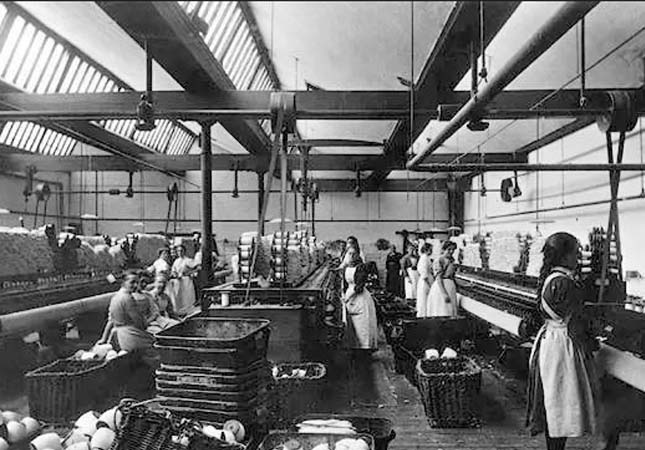England is the birthplace of the Industrial Revolution, with the wool textile industry being the most powerful handicraft industry before the British Industrial Revolution. However, it was replaced by the British cotton textile industry only in the 40 years from the beginning of the 18th century because of the rapid development of the cotton textile market and the innovations of a series of textile machinery such as textile cutting machine, Jenny spinning machine etc. As the backbone of the British industry at that time, the cotton textile industry revolution also was the beginning of the Industrial Revolution.
The Rise and Development of British Cotton Textile Industry
The cotton textile industry in the UK was originally developed as a close integration between cotton textiles and cottage industries and agriculture. Both in terms of labor organization and tools and equipment, it followed the development model of the wool textile industry. Although the British cotton cloth had been exported, the total export value was less than 46,000 pounds, which was far behind the wool textile industry. However, in the following decades, such an emerging and relatively backward industry has significantly surpassed the traditional British wool textile industry in terms of development speed and scale, becoming the forerunner of the British Industrial Revolution, promoting the occurrence and development of the Industrial Revolution in England.
Main Reasons
1. Expansion of Cotton Textile Market
The Americas gradually became a newly market for cotton textile before the Industrial Revolution because of the expansion colonization of the British in North America, and cotton fabrics trade became an influential method to exchange slaves in Africa for European colonists. The changing lifestyle of Europe has also opened up a broad market prospect for cotton textiles. It can be indicated that the demand for cotton textiles in the international market has severely increased.
Since the 18th century, with the prosperity of the European economy and the continuous improvement of living standards, great changes have taken place in social fashion. People are more interested in lightweight and practical cotton clothes because the clothes that are made of cotton with pretty patterns and bright colors are not only comfortable and warm, but also inexpensive and exquisite in appearance. It is reported that the per capita consumption of raw cotton in England was 200 grams during 1750-1760, which was 2 times more than that in 1698 to 1710. The consumption also increased to 100 grams in France, Switzerland, Prussia and other countries.
2. Machine Innovation
As a new industry, the cotton textile industry is relatively less restricted by feudal guilds and government regulations so that new technologies and new inventions can be more easily applied and developed in the cotton textile industry.
In 1764, Hargreaves invented the Jenny spinning machine; in 1768, Arkwright made a hydraulic spinning machine, which was a key breakthrough in the technological revolution. The spinning machine no longer relied on human power from then on. Then Cartwright, with the help of carpenters and blacksmiths, invented the power loom in 1785, which has since increased the efficiency of weaving by almost 40 times. The technological revolution of the cotton textile industry stimulated the technological revolution of other industries and transportation industries, which in turn promoted the vigorous development of the cotton textile industry in the UK.

The rapid development of the cotton textile industry surpassed the traditional wool textile industry only 40 years after the start of the Industrial Revolution. Since the 18th century, the cotton textile industry has been developing rapidly due to its easy acceptance of improved technologies and advanced machines. With the encouragement and support of British government policies, the British industrial structure has been transformed from an agricultural country to an industrial and trade-oriented industrialized country, and as the horn of the British Industrial Revolution, made it the first in the world to embark on the road of the Industrial Revolution, and in the next period of time, it will monopolize the world economic hegemony.




